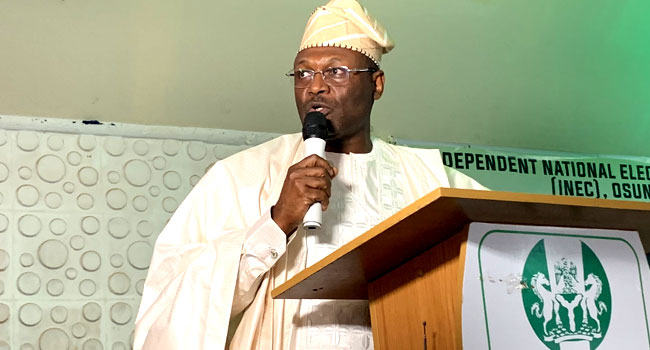Ahead of next year’s General Election, Chairman, Independent National Electoral Commission INEC, Prof. Mahmood Yakubu has assured of his firm commitment to delivering a free, fair and credible election, saying his ultimate goal is electoral justice which would allow every Nigerian experience electoral fulfilment.
Yakubu who was represented by the INEC National Commissioner in charge of Information, Voter Education and Publicity Committee IVEP made the pledge Monday in Lagos at the opening of a two-day capacity building workshop organized in conjunction with Development Alternatives Incorporated DAI and the European Union for the INEC Press Corp on ‘Critical issues in the Electoral Act, 2022 and the Commission’s Processes, Innovations, Preparations for the 2023 General Election’.
At the event, Yakubu said the Commission is conscious of the critical role of the media in Nigeria’s political and electoral process and believes that democracy will only grow and flourish through adherence by the media to professional and ethical standards.
He assured Nigerians that the Commission will deploy and continue to deploy appropriate technology for the conduct of elections, adding that the Bimodal Voter Accreditation System BVAS and INEC Result Viewing Portal IreV will be deployed for the conduct of the 2023 general election.
“We will continue to use technology to improve and enhance the credibility of elections in Nigeria. Our goal is electoral justice where every Nigerian will experience electoral fulfilment”, said Yakubu.
Noting that the Commission has entered a critical phase in the electoral process, Yakubu added that INEC has now undertaken eight out of the 14 items on the Calendar and Schedule of Activities for the 2023 General Election.
“On 20th September 2022, the Commission released the Final List of Candidates standing nominated for National Elections (Presidential and Vice-Presidential candidates, Senatorial and House of Representative Candidates). On 4th October 2022, the Commission will release the Final List of candidates standing nominated in relation to State Elections (Governorship, Deputy Governorship and State Assemblies).
“On 28th September 2022 Presidential and National Assembly campaigns will start while that of Governorship and State Assembly candidates will start on 12th October 2022. The Commission will continue to adhere to set timelines in carrying out its activities”, he stated.
Yakubu urged the 18 registered political parties to critically study and pay attention to the provisions of the Constitution, the Electoral Act, the Police Act and the Public Order Act for the proper and peaceful conduct of political campaigns, rallies and processions.
According to him, a political campaign or slogan shall not be tainted with abusive language directly or indirectly likely to injure religious, ethnic, tribal or sectional feelings.
“Abusive, intemperate, slanderous or base language or innuendoes designed or likely to provoke violent reaction or emotions shall not be employed or used in political campaigns. Let me also remind the media of their constitutional and legal obligations. State apparatus including the media shall not be employed to the advantage or disadvantage of any political party or candidate at any election. In other words, equal coverage and visibility shall be allotted to all political parties by all public print and electronic media organisations. The same applies in equal measure to private owned media organizations subject to payment of appropriate fees”, he stated.
Yakubu added that the Commission is conscious that a credible voter register is the basic requirement for the conduct of a credible election, noting that INEC has therefore devoted time and energy to the cleaning up of the voter register using the Automated Biometric Identification System (ABIS).
Team Leader of DAI, Rudolf Elbling said his organization is “working with INEC for five years to assist them with whatever they need to organize credible elections”.
Noting that in an election season, there is a lot of fake news, misinformation and disinformation, Elbling said the media is an important partner in the quest for credible elections in Nigeria.
I’m his welcome address, INEC Resident Electoral Commissioner REC in Lagos state, Segun Agbaje said since the media usually have the privilege of the last word, they should ensure that the electorate, politicians and INEC play their roles effectively.
Agbaje advised the media to clean itself, shun corruption and avoid smear campaigns so that it can guarantee a free and fair election for Nigerians.
“The media must ensure that the rule of law is upheld and so it must not become lawless itself”, he stated.
Setting the aims and objectives of the workshop, Chief Press Secretary to the INEC Chairman, said since the conclusion of the 2019 General Election, the Commission has embarked on internal restructuring and several innovations aimed at improving its services and the electoral process.
“It has engaged and continues to interact with critical stakeholders, including the judiciary and the National Assembly, on the need for a paradigm shift in the electoral system. These efforts produced some positive results, including the replacement of the old Electoral Act 2010 with a new Electoral Act 2022.
“The workshop’s main objective is to broaden the participants’ knowledge about the Commission’s processes and procedures, innovations, critical aspects of the new Electoral Act 2022 and preparations for the 2023 General Election”, he said.
Chairman of the INEC Press Corps, Mr Segun Ojumu in his goodwill message noted that the story and history of the 2023 general election would be mostly written by election reporters.
“A lot of fake news, misinformation and disinformation have found their way to the media space. INEC must be on top of its game and react quicker to media inquiries”, he charged.


